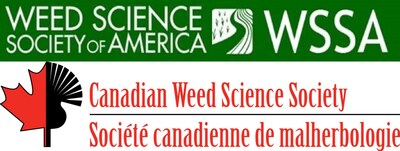U.S. and Canadian Weed Scientists Convene for 2025 Annual Meetings
The WSSA and CWSS will meet February 24-27, and the WSWS will meet March 10-13
WESTMINSTER, Colo., Jan. 15, 2025 /PRNewswire/ -- The Weed Science Society of America (WSSA) will meet jointly with the Canadian Weed Science Society (CWSS) at the Sheraton Wall Centre in Vancouver, British Columbia, Canada, February 24-27, 2025, for their annual meetings. Following that, the Western Society of Weed Science (WSWS) will meet at the Westin Seattle in Seattle, Washington, March 10-13, 2025.
"Top weed scientists gather to share the latest knowledge on weed impact in managed and natural ecosystems." - Greg Dahl"We're excited to gather many of North America's finest weed scientists to encourage and promote the latest knowledge concerning weeds and their impact on managed and natural ecosystems," says Greg Dahl, WSSA president. "We're proud to promote cooperation among weed scientists across North America and around the world, and we would love for all those with an interest in weed management to consider joining us and sharing in our discussions."
The joint WSSA/CWSS meeting features four symposia from Tuesday through Thursday including:
- Description of the EPA's Herbicide Strategy, Communication Resources, and Scientific Information Useful to Regulators, organized by Bill Chism and WSSA's Endangered Species Act (ESA) Committee
- Not your Old Professor's Journals - Rapid Change in Academic Publishing, organized by Sarah Ward, Chris Willenborg and WSSA's Publications Committee
- Experiences and Insights from Recently Funded Weed Scientists in NIFA's Competitive Grant Programs, organized by James Kells and Vijay Nandula
- Contribution of Genomics to Non-target Site Resistance Knowledge and Management, organized by Roland Beffa, Caio Brunharo and WSSA's Herbicide Resistant Plants Committee
The symposia offer up-to-date and in-depth reports on critical weed management topics. For example, "metabolic herbicide resistance poses a significant challenge to sustainable weed management, and genomics offers a promising avenue to better understand and address this issue," says Caio Brunharo, Ph.D., Penn State University assistant professor. "This symposium will bring together global experts to share insights into the mechanisms behind metabolic resistance, innovative predictive tools, and practical strategies for its effective mitigation. By advancing our knowledge, these discussions aim to lay the groundwork for a deeper understanding of metabolic resistance and its management."
EPA's Herbicide strategy is another compelling symposium topic. "In order to protect endangered species, the EPA may add additional mitigation measures to pesticide labels, and because of their extensive work on herbicide-resistant crops, herbicides will be one of the first groups to see these changes," says Bill Chism, WSSA's ESA Committee Chair. "This is an excellent group of speakers from federal and state organizations who will describe potential label changes, how these changes could protect threatened and endangered species, types of data our members could collect to improve the process, and how weed scientists can collaborate with multiple groups to help communicate the coming changes."
In addition to cutting-edge research talks and poster presentations, this year's meeting will offer a very strong program for graduate students and excellent keynote speakers. The keynote speaker for the joint General Session meeting on Monday will be Jennifer Grenz, Ph.D., an assistant professor and indigenous scholar in the Department of Forest Resources Management at the University of British Colombia. Her address is titled, "Are They Rising from the Ashes? Re-Learning Invasive Species Management on Post-Wildfire Landscapes in British Columbia." Dr. Grenz has just published, "Medicine Wheel for the Planet: A Journey Toward Personal and Ecological Healing" – a book based on her Ph.D. dissertation.
Meeting participants will also have opportunities to join a walking tour to Granville Market, a Harbor Boat tour and comedy show, a 5K Puff Run and visits to local craft breweries. Meeting and hotel information can be found at the WSSA website: 2025 Annual Meeting - Weed Science Society of America.
Western Society of Weed Science -- March 10-13, 2025, Seattle, Washington
Only a few weeks following the WSSA/CWSS meeting, the WSWS will convene for its annual meeting in Seattle, March 10-13. Sarah Collier, Ph.D., an assistant professor of Food Systems, Nutrition, and Health at the University of Washington Department of Environmental and Occupational Health Sciences will provide the keynote address, titled "Blue Carbon, Green Fields: Mobilizing Marine Algae to Benefit Sea and Soil in the Pacific Northwest." The program committee is also excited to offer a symposium organized by Emma Kubinski and Dr. Fabian Menalled, entitled "Innovative Approaches for Weed Science Education and Communication."
New for this year, there will be a social hour hosted by the WSWS Diversity & Inclusion Committee. Meeting registration and hotel reservation information can be found on the Annual Meeting 2025 page on the WSWS website. The hotel reservation deadline is February 15, 2025.
For more information about WSSA and its upcoming meetings, visit https://wssa.net/meeting/calendar-of-meetings/.
About the Weed Science Society of America
The Weed Science Society of America, a nonprofit scientific society, was founded in 1956 to encourage and promote the development of knowledge concerning weeds and their impact on the environment. The Society promotes research, education and extension outreach activities related to weeds, provides science-based information to the public and policy makers, fosters awareness of weeds and their impact on managed and natural ecosystems, and promotes cooperation among weed science organizations across the nation and around the world. For more information, visit www.wssa.net.
![]() View original content to download multimedia:https://www.prnewswire.com/news-releases/us-and-canadian-weed-scientists-convene-for-2025-annual-meetings-302350714.html
View original content to download multimedia:https://www.prnewswire.com/news-releases/us-and-canadian-weed-scientists-convene-for-2025-annual-meetings-302350714.html
SOURCE Weed Science Society of America


